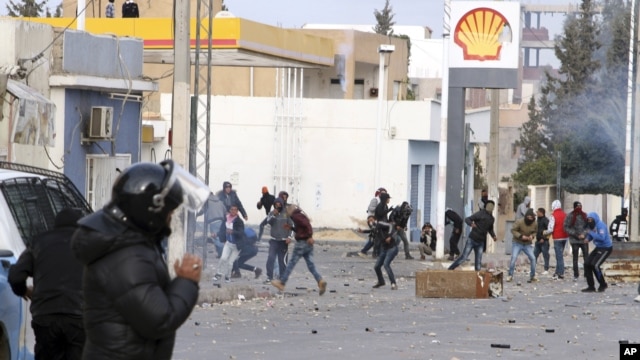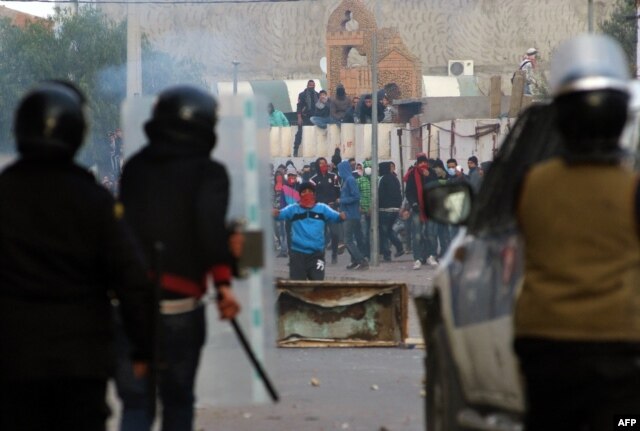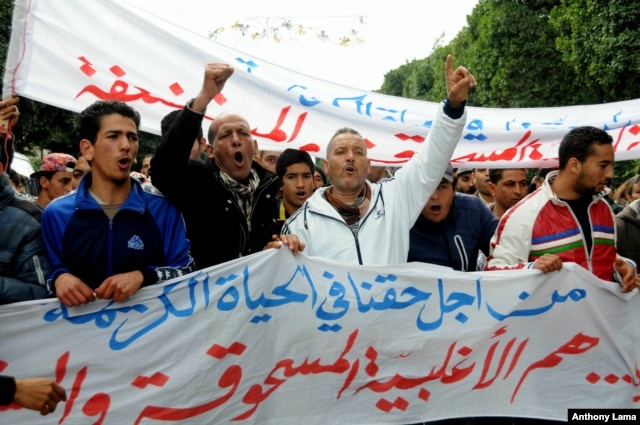They say the government has failed to even outline a plausible program to develop Tunisia economically, especially to help develop distressed rural areas, which have become recruiting grounds for jihadists. Their fears were borne out this week when Tunisia became engulfed in violent street protests and attacks on police stations, which prompted the government to order an overnight nationwide curfew on Friday. The Interior Ministry said in a statement that attacks on public and private property “represent a danger to the country and its citizens.”
Protesters throw items at police forces in the city of Ennour, near Kasserine, Tunisia, Jan. 20, 2016. Tunisia has declared a curfew in the western city after clashes between police and more than 1,000 young protesters demonstrating for jobs.
Government officials said they needed the curfew to try to prevent a repeat of Thursday night, when police stations came under assault and security personnel resorted to tear gas to stop protesters armed with stones and Molotov cocktails from looting stores and warehouses. The street demonstrations started last week after a young man who failed to secure a government job scaled a transmission tower in Kasserine, an impoverished city in the center of the country, in protest and was electrocuted. More angry youngsters have threatened to kill themselves. Two were injured this week after trying to throw themselves off the roof of a local government building.
Frustrated youth
While the government has focused on the jihadist threat, fearing that returning fighters from Syria would present a real challenge to the state, the more immediate danger for weeks has been from working class youngsters frustrated with the few job opportunities available to them. “Unfortunately, the situation is getting worse,” says university professor Jelel Ezzine, president of the Tunisian Association for the Advancement of Science, Technology and Innovation, a research institution. “In addition to the incompetence of the government and the political system, the coalition behind the government is blindly defending the ministers and their non-deeds irrespective of the results and the ongoing unrest,” he adds.
Protesters clash with security forces in the central town of Kasserine, Tunisia
He says the government is failing to understand that the economic fundamentals have to change and they must be “addressed head on.” Under the surface, there has been growing public disaffection with the government for months. Working class Tunisians who hoped the Arab spring ouster of longtime strongman Zine Abidine Ben Ali would bring jobs have seen little economic benefit. Thirty-seven percent of young Tunisians are unemployed and jobless graduates have been joining the labor movement in increasing numbers of protests and sit-ins. Strikes by public sector workers have recently soared.
Unemployed protesters demonstrate in Tunis
In a televised address Friday night, Tunisia’s president, Beji Caid Essebsi, said he understands the frustration that has built up and led to this week’s protests over unemployment, but he cautioned that instability could be exploited by jihadists. He pledged the country would “get out of this ordeal.” “There is no dignity without work. You can't tell someone who has nothing to eat to stay patient,” the president acknowledged. He warned that the Islamic State militant group in neighboring Libya could use the unrest "to infiltrate into Tunisia". Unemployment has worsened since the 2011 revolution that toppled Ben Ali — the first in a series of uprisings across the Arab world. Tunisia has, in many ways, remained the one hopeful story to come out of the Arab spring, the only country in the region that overthrew a dictator and emerged as a democracy.
Jihadist threat


